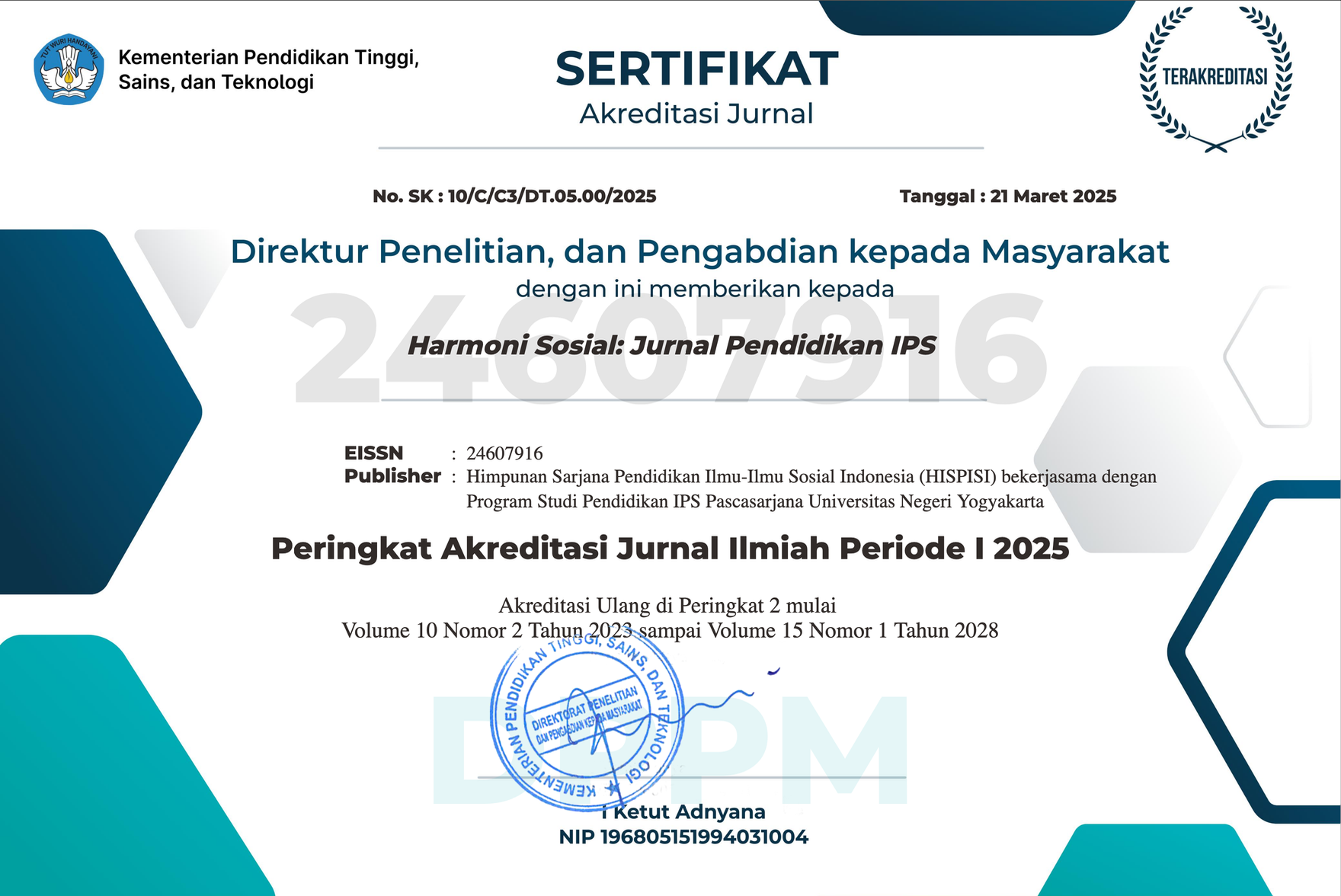The youth rationality of working in the tourism in Derawan Island, Berau Regency, East Borneo, Indonesia
Downloads
Downloads
Abercrombie, N., Hill, S., & Turner, B. S. (2010). Kamus sosiologi. Yogyakarta: Pustaka Pelajar.
Akan, Y., Işık, C., & Arslan, I. (2007). The Impact of Tourism on Economic Growth: The Case of Turkey. Journal of Tourism, 9. Retrieved from https://www.researchgate.net/publication/228270513_The_Impact_of_Tourism_on_Economic_Growth_The_Case_of_Turkey
Asmelash, A. G. (2015). An assessment of potential resources of tourism development in Ethiopia: The case of Dejen Wereda. African Journal of History and Culture, 7(4), 100–108. https://doi.org/10.5897/AJHC2014.0217
Bal, H., Akí§a, E. E., & Bayraktar, M. (2016). The contribution of tourism to economic growth: A research on the Turkey. Akademik Yaklaşımlar Dergisi, 7(1), 1–20. Retrieved from https://dergipark.org.tr/en/pub/ayd/issue/27225/286552#article_cite
Creswell, J. W. (2011). Educational research planning: Planning, conducting, and evaluating quantitative and qualitative research. London: Pearson Education.
Destriana, N. M., Nurhadi, N., & Pranawa, S. (2020). Foodstagramming hyperreality in consumption behavior in Indonesia. Harmoni Sosial: Jurnal Pendidikan IPS, 7(1), 85–95. https://doi.org/10.21831/hsjpi.v7i1.28916
Garg, A. (2015). Travel risks vs tourist decision making: A tourist perspective. International Journal of Hospitality and Tourism Systems, 8(1), 1–9. Retrieved from https://expert.taylors.edu.my/file/rems/publication/100397_1104_1.pdf
Gí¶rmí¼ÅŸ, A. (2017). The micro determinants of informal youth employment in Turkey (S. Koc, A. Orhan, & M. C. Gí¶zen, Eds.). London: IJOPEC Publication.
Indraningsih, G. . K. A. (2019). Implementasi kebijakan pembangunan pariwisata kota Palu. Jurnal Pariwisata PaRAMA : Panorama, Recreation, Accomodation, Merchandise, Accessbility, 1(1), 31–40. Retrieved from http://jurnal.stahds.ac.id/jurnalPariwisataPaRAMA/article/view/257
Jang, S. (Shawn), Bai, B., Hu, C., & Wu, C.-M. E. (2009). Affect, Travel Motivation, and Travel Intention: a Senior Market. Journal of Hospitality & Tourism Research, 33(1), 51–73. https://doi.org/10.1177/1096348008329666
Madya, S. H. (2020). Mobilitas permanen: Backpacking sebagai karier subkultural kaum muda nomad kontemporer. Jurnal Studi Pemuda, 9(1), 27–38. https://doi.org/10.22146/studipemudaugm.54814
Merga, S. (2019). Assessment of potential tourism resources in Elkere District of the Ethiopian Somali Region. Journal of Tourism & Hospitality, 8(2), 1–8. Retrieved from https://www.longdom.org/abstract/assessment-of-potential-tourism-resources-in-elkere-district-of-the-ethiopian-somali-region-25876.html
Mujiono, D. I. K. (2018). Potensi bahari Pulau Derawan menuju destinasi wisata kompetitif. DINAMIKA GLOBAL : JURNAL ILMU HUBUNGAN INTERNASIONAL, 3(2), 55–87. https://doi.org/10.36859/jdg.v3i02.76
Nilsson, B., & Shehu, E. (2014). Informal employment among youth: evidence from 20 school-to-work transition surveys. Geneva: ILO Publications.
Nugroho, A. D., Waluyati, L. R., & Jamhari, J. (2018). Upaya memikat generasi muda bekerja pada sektor pertanian di Daerah Istimewa Yogyakarta. JPPUMA (Jurnal Ilmu Pemerintahan Dan Sosial Politik UMA) (Journal of Governance and Political Social UMA), 6(1), 76–95. https://doi.org/10.31289/jppuma.v6i1.1252
Pitana, I. G., & Diarta, I. K. S. (2009). Pengantar ilmu pariwisata (1st ed.). Yogyakarta: Andi.
Primadany, S. R. (2013). Analisis strategi pengembangan pariwisata daerah (Studi pada Dinas Kebudayaan dan Pariwisata Daerah Kabupaten Nganjuk). JAP (Jurnal Administrasi Publik), 1(4), 135–143. Retrieved from http://administrasipublik.studentjournal.ub.ac.id/index.php/jap/article/view/126
Ritzer, G., & Goodman, D. J. (2008). Teori sosiologi: Dari teori sosiologi klasik sampai perkembangan mutakhir tori sosial postmodern. Yogyakarta: Kreasi Wacana.
Seguí-Amortegui, L., Clemente-Almendros, J. A., Medina, R., & Grueso Gala, M. (2019). Sustainability and Competitiveness in the Tourism Industry and Tourist Destinations: A Bibliometric Study. Sustainability, Vol. 11. https://doi.org/10.3390/su11226351
Setiawan, I. (2015). Potensi destinasi wisata di Indonesia menuju kemandirian ekonomi. Prosiding Seminar Nasional Multi Disiplin Ilmu & Call for Papers UNISBANK. Retrieved from https://unisbank.ac.id/ojs/index.php/sendi_u/article/view/3321/928
Sofronov, B. (2018). The development of the traveland tourism industry in the world. Annals of Spiru Haret University, Economic Series, 18(4), 123–137. Retrieved from https://econpapers.repec.org/RePEc:ris:sphecs:0348
Tabash, M. I. (2017). The role of tourism sector in economic growth: An empirical evidence from Palestine. International Journal of Economics and Financial Issues, 7(2), 103–108. Retrieved from https://www.researchgate.net/profile/Mosab-Tabash/publication/327338318_The_Role_of_Tourism_Sector_in_Economic_Growth_An_Empirical_Evidence_From_Palestine/links/5b88f6744585151fd13dd974/The-Role-of-Tourism-Sector-in-Economic-Growth-An-Empirical-Evidence-From-Palestine.pdf
TurnÅ¡ek, M., Brumen, B., Rangus, M., Gorenak, M., Mekinc, J., & Å tuhec, T. L. (2020). Perceived threat of COVID-19 and future travel avoidance: Results from an early convenient aample in Slovenia. Academica Turistica, 13(1), 3–19. Retrieved from http://academica.turistica.si/index.php/AT-TIJ/article/view/232
Ulum, A. Z., & Suharno, S. (2019). Infiltrasi budaya global terhadap budaya lokal pesta Baratan dalam mempengaruhi pembentukan budaya kewargaan. Harmoni Sosial: Jurnal Pendidikan IPS, 6(2), 137–144. https://doi.org/10.21831/hsjpi.v6i2.10023
White, J. M., & Klein, D. M. (2007). Family theories (3rd ed.). SAGE Publications Inc.
Wong, M., Cheung, R., & Wan, C. (2013). A study on traveler expectation, motivation and attitude. Contemporary Management Research, 9(2 SE-Special Issue for ICMS conference). https://doi.org/10.7903/cmr.11023
Wulantami, A. (2018). Pilihan rasional keputusan perempuan sarjana menjadi ibu rumah tangga. DIMENSIA: Jurnal Kajian Sosiologi, 7(1), 1–22. https://doi.org/10.21831/dimensia.v7i1.21049
The Authors submitting a manuscript do so on the understanding that if accepted for publication, copyright publishing of the article shall be assigned to Harmoni Sosial: Jurnal Pendidikan IPS
 | Harmoni Sosial: Jurnal Pendidikan IPS by http://journal.uny.ac.id/index.php/hsjpi is licensed under a Creative Commons Attribution-ShareAlike 4.0 International License. |









 ISSN Print
ISSN Print









